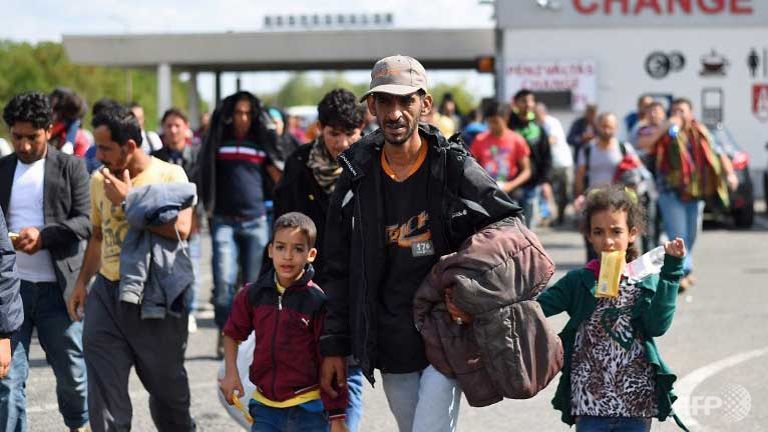Europe divided as record numbers of migrants cross into Hungary
 |
| Migrants cross the border between Hungary and Austria near Nickelsdorf, Austria, as thousands of migrants continue to cross into Hungary over the last few days from Serbia. (AFP PHOTO/JOE KLAMAR) |
ROSZKE, Hungary: Europe was increasingly divided over its refugee crisis on Thursday (Sep 10) as record numbers of migrants streamed through the Balkans into Hungary, forcing Austria to suspend cross-border train services.
Germany warned that an EU plan to distribute 160,000 new arrivals among member states was a mere "drop in the ocean", but it faces stiff opposition from eastern members who say they will not accept binding quotas from Brussels.
Hungarian police said 3,321 people had entered in just 24 hours, hurrying to cross before harsh new anti-migrantlaws take effect, an imposing new fence is completed, and the weather worsens.
Across the border in Serbia, state television reported that a record 5,000 people had arrived at the frontier. Further south, on Macedonia's border with Greece, AFP journalists saw some 50 buses transporting around 2,500migrants and three trains packed with 3,000 people departing from the town of Gevgelija.
The UN's refugee agency on Tuesday warned that at least 42,000 migrants were expected to enter Hungary by next week. Many have endured treacherous sea journeys across the Mediterranean - most fleeing war and poverty in Syria, Afghanistan or Pakistan and hoping to reach Germany.
Once inside Hungary, overstretched police have struggled to control and register new arrivals as they break through fences and try to board trains and buses heading for Austria.
Austria's train operator suspended services with Hungary on Thursday due to "massive overcrowding", calling on bus companies and volunteers to stop bringing migrants to stations.
'An accountancy exercise'
EU interior ministers will meet on Monday to discuss a plan unveiled by European Commission chief Jean-Claude Juncker to share out 160,000 refugees across the bloc and ease the burden on frontline states.
Germany, which has already welcomed 450,000 migrants this year, wants the 28-nation group to go further, calling for no limits to the quotas. "The distribution of 160,000 refugees across Europe is a first step, if one wants to be polite," said Deputy Chancellor Sigmar Gabriel. "It's a drop in the ocean."
But binding quotas are already facing fierce resistance from eastern EU members and Brussels may have to call a special summit to get them approved.
"It is inappropriate to talk about mandatory quotas, calculated on an extremely bureaucratic basis, almost like an accountancy exercise I might say, without consulting member states," said Romania President Klaus Iohannis.
His views echoed those of Slovakian Prime Minister Robert Fico, who said Wednesday he did not "want to wake up one day and have 50,000 people here about whom we know nothing."
German Foreign Minister Frank-Walter Steinmeier will try to win over eastern European counterparts at a meeting in Prague on Friday.
Juncker's proposals also include a possible revision of the EU's much-criticised Dublin Treaty, under which asylum claims must be processed by the first country that refugees arrive in.
Some help may be on the way from outside, with US Secretary of State John Kerry on Wednesday seeking to drum up support for the country to accept more refugees.
EU lawmakers called for an international conference on migration bringing together the US, United Nations and Arab states.
Washington has accepted only a tenth of the 15,000 Syrians referred to it by the UNHCR since the conflict erupted in 2011.
Australia said it would take an additional 12,000 Syrians and Iraqis and several South American countries also agreed to help.
Walking for hours
Meanwhile, on the Greek island of Lesbos, another flashpoint, the boats kept arriving. Hundreds - perhaps thousands - were making a gruelling 50-60 kilometre walk from their landing place to the main town where they must go to receive registration papers.
"We have been walking for four hours. There is no bus, no taxi, no water, no anything," said Mohammed Yassin al-Jahabra, a 23-year-old English literature student, surrounded by a crowd of anxious and exhausted friends and family.
Earlier this week, officials on Lesbos registered a staggering 15,000 refugees in just over 24 hours after a huge backlog had built up, leaving people stranded on the island for days in filthy conditions.
But the boats are still arriving at an astonishing pace, with six landing in the space of an hour on Wednesday and four more in the distance, each carrying 40-60 people, AFP correspondents said.
"As soon as I put my feet down (on dry land), I stopped feeling tired," said Feras Tahan, a 34-year-old Syrian graphic designer, his shoes and trousers soaked.
What the stars mean:
★ Poor ★ ★ Promising ★★★ Good ★★★★ Very good ★★★★★ Exceptional
Latest News
More News
- Russian President congratulates Vietnamese Party leader during phone talks (January 25, 2026 | 09:58)
- Worldwide congratulations underscore confidence in Vietnam’s 14th Party Congress (January 23, 2026 | 09:02)
- Political parties, organisations, int’l friends send congratulations to 14th National Party Congress (January 22, 2026 | 09:33)
- 14th National Party Congress: Japanese media highlight Vietnam’s growth targets (January 21, 2026 | 09:46)
- 14th National Party Congress: Driving force for Vietnam to continue renewal, innovation, breakthroughs (January 21, 2026 | 09:42)
- Vietnam remains spiritual support for progressive forces: Colombian party leader (January 21, 2026 | 08:00)
- Int'l media provides large coverage of 14th National Party Congress's first working day (January 20, 2026 | 09:09)
- Vietnamese firms win top honours at ASEAN Digital Awards (January 16, 2026 | 16:45)
- ASEAN Digital Ministers' Meeting opens in Hanoi (January 15, 2026 | 15:33)
- ASEAN economies move up the global chip value chain (December 09, 2025 | 13:32)
















 Mobile Version
Mobile Version